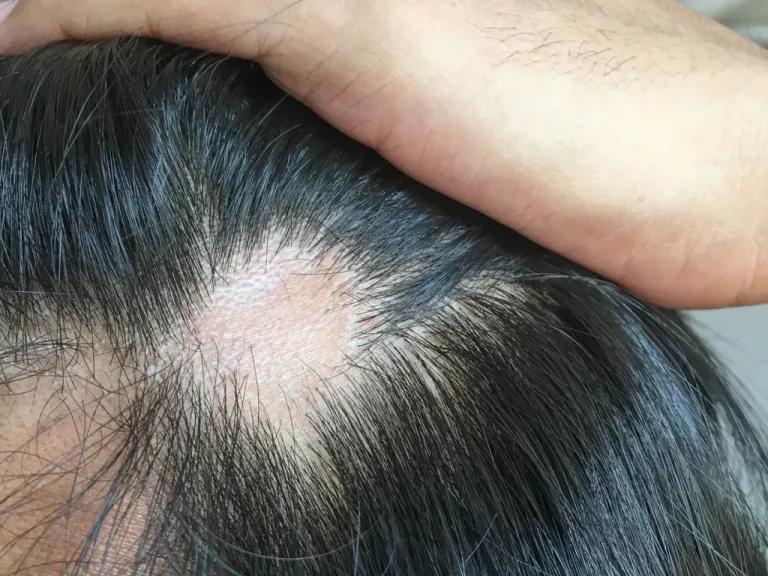Dandruff is a common skin condition that affects the scalp, resulting in the shedding of dead skin cells. While it is not a serious medical condition, it can be persistent and cause discomfort. The flakes of skin associated with dandruff are often more noticeable on dark hair and may fall onto the shoulders, causing embarrassment for some individuals. Dandruff is not contagious and cannot be caught by others.
In this comprehensive guide, we will explore the causes, symptoms, and various treatment options for dandruff.
Understanding the causes of dandruff
The exact cause of dandruff is not fully understood, but several factors are believed to contribute to its development. These include:
- Irritated, oily skin: Excess oil production on the scalp can lead to the buildup of dead skin cells, resulting in dandruff
- Dry skin: Dry scalp can cause flaking and dandruff, especially during colder months
- Malassezia: A yeast-like fungus called Malassezia is found on the scalps of most adults. It feeds on the oils produced by the hair follicles and can contribute to dandruff when it grows out of control
- Sensitivity to hair care products: Some individuals may develop dandruff as a result of an allergic reaction or sensitivity to certain hair care products
- Other skin conditions: Conditions such as psoriasis and eczema can contribute to the development of dandruff
Factors that increase the risk of dandruff
While anyone can develop dandruff, certain factors increase the risk. These include:
- Age: Dandruff commonly begins in young adulthood and continues through middle age, although it can persist throughout life for some individuals
- Gender: Dandruff is more prevalent in males than females
- Certain illnesses: Conditions that affect the nervous system, such as Parkinson’s disease, can increase the risk of dandruff. Additionally, individuals with HIV or a weakened immune system may be more susceptible
Recognising the symptoms of dandruff
The most common symptoms of dandruff include:
- Skin flakes on the scalp, hair, eyebrows, beard, or moustache
- Itchy scalp
- Scaly or crusty scalp in infants with cradle cap
Symptoms may worsen with stress and tend to flare up during cold, dry seasons.
Self-treatment options for dandruff
Mild cases of dandruff can often be managed with self-care measures. The following treatment options can help alleviate symptoms and reduce the appearance of white flakes:
Using anti-dandruff shampoos
Anti-dandruff shampoos are the first line of defence against dandruff. They are widely available over the counter and contain specific ingredients that target the underlying causes of dandruff. When using anti-dandruff shampoos, it is important to:
- Follow the instructions provided by the manufacturer and your pharmacist
- Use the shampoo regularly, as instructed, for at least a month to assess its effectiveness
- Massage the shampoo into the scalp and leave it on for the recommended duration before rinsing
Choosing the right ingredients
Several active ingredients commonly found in anti-dandruff shampoos are effective in treating dandruff:
- Zinc pyrithione: This ingredient helps to control the growth of yeast on the scalp
- Salicylic acid: Salicylic acid helps to exfoliate the scalp and remove dead skin cells
- Selenium sulfide: Selenium sulfide slows down the production of skin cells and helps manage dandruff by reducing scalp glands’ production of natural oils
- Ketoconazole: Ketoconazole is an antifungal agent that targets the fungus responsible for dandruff
- Coal tar: Tar-based shampoos help to slow down the growth of skin cells on the scalp
Tips for effective use
To achieve the best results with anti-dandruff shampoos, consider the following tips:
- Allow the shampoo to remain on the scalp for the recommended duration before rinsing
- Massage the shampoo into the scalp using gentle circular motions to help remove dead skin cells and improve circulation
- Avoid using excessive heat while washing your hair, as hot water can exacerbate scalp dryness
- If one type of shampoo does not provide satisfactory results, try another with a different active ingredient
When to seek medical advice
In most cases, dandruff can be effectively managed with over-the-counter treatments. However, it is advisable to consult a healthcare professional if:
- Dandruff symptoms persist after using an anti-dandruff shampoo for a month
- The dandruff is severe or accompanied by intense itching
- The scalp appears red or swollen
- Flaky, itchy patches develop on the face or other areas of the body
A healthcare provider, such as a primary care doctor or dermatologist, can assess the condition and determine if further medical intervention is necessary.
Exploring medical treatments for dandruff
In cases where self-care measures and over-the-counter treatments have proven ineffective, medical interventions may be recommended. These can include prescription shampoos and topical treatments, as well as oral medications.
Prescription shampoos and topical treatments
Prescription-strength shampoos and topical treatments contain higher concentrations of active ingredients and may be more effective in managing stubborn dandruff. These products are typically recommended for more severe cases or when over-the-counter options have failed.
Oral medications
In certain situations, oral medications may be prescribed to treat dandruff. These medications are typically reserved for severe cases or when dandruff is associated with an underlying medical condition.
Dandruff vs. other scalp conditions
Dandruff shares similarities with other scalp conditions, such as seborrheic dermatitis, psoriasis, eczema, contact dermatitis, and tinea capitis (ringworm). Understanding the differences between these conditions can help with accurate diagnosis and appropriate treatment.
Seborrheic dermatitis
Seborrheic dermatitis is a common skin condition characterized by scaly, itchy, and red patches on the scalp, face, and other areas of the body. It is often associated with excessive oil production and the overgrowth of yeast on the skin.
Psoriasis
Psoriasis is a chronic autoimmune condition that causes red, flaky, and crusty patches of skin covered with silvery scales. It can affect various parts of the body, including the scalp.
Eczema
Eczema, also known as atopic dermatitis, is a chronic inflammatory skin condition characterized by dry, red, flaky, and very itchy skin. It can occur in different areas of the body, including the scalp.
Contact dermatitis
Contact dermatitis is an allergic reaction or irritation of the skin caused by contact with certain substances, such as hair dyes, sprays, gels, or mousses. It can result in red, flaky, crusty, and sore patches of skin.
Tinea capitis (ringworm)
Tinea capitis, commonly known as ringworm, is a fungal infection that can affect the scalp. It can cause a red or silver rash on the scalp, sometimes accompanied by patchy hair loss.
Prevention tips for dandruff
While dandruff may not always be preventable, certain measures can help reduce the risk of its occurrence. These include:
- Good hair hygiene practices: Regularly washing the hair with a gentle shampoo and avoiding excessive oil or product buildup can help prevent dandruff
- Avoiding triggers: Identifying and avoiding factors that worsen dandruff symptoms, such as stress or exposure to cold weather, can help prevent flare-ups
Conclusion
Dandruff is a common skin condition that can cause embarrassment and discomfort. While it is not harmful, effective management is essential to alleviate symptoms and reduce recurrence. By understanding the causes, recognizing the symptoms, and exploring various treatment options, individuals can effectively manage dandruff and maintain a healthy scalp. Remember to consult a healthcare professional if self-care measures are not effective or if the condition worsens. With proper care and treatment, dandruff can be successfully controlled, allowing individuals to enjoy healthy and flake-free hair.
Sources
Medical Disclaimer
NowPatient has taken all reasonable steps to ensure that all material is factually accurate, complete, and current. However, the knowledge and experience of a qualified healthcare professional should always be sought after instead of using the information on this page. Before taking any drug, you should always speak to your doctor or another qualified healthcare provider.
The information provided here about medications is subject to change and is not meant to include all uses, precautions, warnings, directions, drug interactions, allergic reactions, or negative effects. The absence of warnings or other information for a particular medication does not imply that the medication or medication combination is appropriate for all patients or for all possible purposes.
Related Articles
Are there any natural home remedies for dandruff?
For individuals seeking alternative or complementary treatments, several natural remedies may help alleviate dandruff symptoms. While scientific evidence supporting their effectiveness is limited, some individuals report positive results with the following remedies:
Tea tree oil
Tea tree oil has antifungal and anti-inflammatory properties, which may help reduce scalp irritation and control the growth of yeast associated with dandruff. It can be diluted with a carrier oil, such as coconut oil, and applied to the scalp.
Apple cider vinegar
Apple cider vinegar has antimicrobial properties that may help control the growth of yeast and balance the pH of the scalp. It can be diluted with water and used as a rinse after shampooing.
Aloe vera
Aloe vera gel has soothing and moisturizing properties that can help alleviate scalp dryness and reduce inflammation. It can be applied directly to the scalp or mixed with a carrier oil.
Coconut oil
Coconut oil can help moisturize the scalp and reduce dryness, which may alleviate dandruff symptoms. It can be applied directly to the scalp and left on for a period of time before shampooing.
Are there any lifestyle changes to manage dandruff?
In addition to using specific treatments, certain lifestyle changes can help manage dandruff and reduce its recurrence. These include:
- Regular hair washing: Washing the hair regularly with a gentle shampoo helps remove excess oil, dead skin cells, and product buildup from the scalp
- Stress reduction: Stress can worsen dandruff symptoms, so finding effective stress management techniques, such as exercise or meditation, may be beneficial
- Healthy diet and hydration: Eating a balanced diet and staying hydrated can promote overall scalp health
- Avoiding irritating hair products: Some hair products, such as gels, sprays, or mousses, can irritate the scalp and worsen dandruff. Avoid using products that irritate








